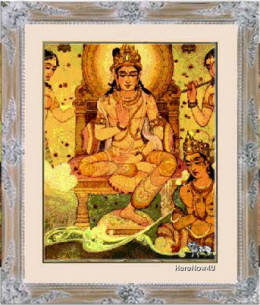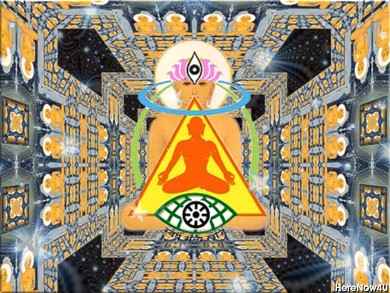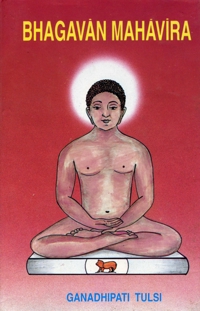| 2 | Thirty Years Of Family Life |

fter all, Trisala was delivered of the child. The birth was celebrated with universal excitement and joy. The mother was the happiest woman on that day. The dreams she had dreamt and the prophecies made by the sooth-sayers etc. began to float in her memory making her still more cheerful.

Trisala had taken every care and practised discipline for the safety and good of the child she had conceived. She took very meagre meals during her pregnancy. She avoided all kinds of rich and harmful food. She lived on a balanced diet. She tried to keep herself as cheerful as she could by avoiding sadness, anxiety, anger, hatred, jealousy, envy etc.
She kept the entire atmosphere cheerful and sweet. She walked slowly, spoke in soft tones and never laughed aloud. She would not sit under the open sky and would not make any kind of hurry. The best development of the child takes place in the womb of mother. The mother is to a very large extent responsible for the development. The mother who knows her responsibility will certainly give birth to a child, which is beautiful, enlightened and valorous. An ignorant mother, on the other hand, gives birth to a child who is ugly, unintelligent and timid. Trisala fulfilled her responsibility successfully. Therefore, she gave birth to a child fully beautiful and possessed of the best qualities. The child was born with divine characteristics. He commanded a wonderful form. His breath was sweet and fragrant. It made the whole atmosphere saturated with a sweet smell. It was a wonderful thing. It was an indication of the fact that the child would be the dharma-cakravarti. The child did not emit any sweat or dirt from its body. Sweat cleans the body of all kinds of dirty substances but the child was inherently pure in every respect. There was nothing unhealthy in its body. The purity of the soul destroys all the ailments of the body. The flesh and blood of the child's body maintained a white colour, which is a sacred mystery and need not be explained in terms of the laws of physiology according to which the blood of a human being contains white as well as red corpuscles. Diseases develop and the body may die even if one variety of these corpuscles is out of the required proportion. This child's body might have maintained a balance between the two kinds of corpuscles and still the colour of its flesh and blood might have remained white like milk.
Thousands of people came to have a look at the extraordinary child and they became exhilarated by the sweet odour its body emitted.
The child was born at a wonderful moment. The breeze was mild and pure. It blew soft. It was spring. The woods were articulate and the trees had become laden with new leaves. It was the thirteenth day of the bright half of the lunar month of Caitra. It was the time of midnight. The portents were auspicious. The planets stood high. Nature greeted the birth of the child with all her cheerfulness and grandeur.
The darkness of the night disappeared and rays of the sun brightened every particle of the earth. Nature began to appear neat and clean. At this sacred hour, Siddhartha was informed by a slave girl that the queen had been delivered of a son. The king's heart began to throb with joy, which knew no Bounds. He rewarded the slave girl with invaluable presents and accorded to her the status of a free citizen for ever. This emancipation of the slave girl was a symbol of the charity the newborn prince was to practise in the future.

[ ]
The king called the Chief Minister and ordered him to celebrate the happy birth of the prince in the most befitting manner. The king's mind was filled with great expectations and new aspirations. The capital was profusely decorated and prisoners were ordered to be released from the prison as is done on such occasions. The happy occasion was to be celebrated with all pomp and show and gaiety. The king expressed the wish that all commodities should be sold in the market at cheaper prices and that the poor should be fed free. The shopkeepers were to be compensated for the loss they would suffer. The Minister was miserly, but looking to the occasion he agreed with the king. The king's wish was announced to the citizens in no time to their great pleasure. The whole day was spent by the people in joyous festivities. The celebrations lasted for seven days to the great comfort of the poor.
 Acharya Tulsi
Acharya Tulsi

